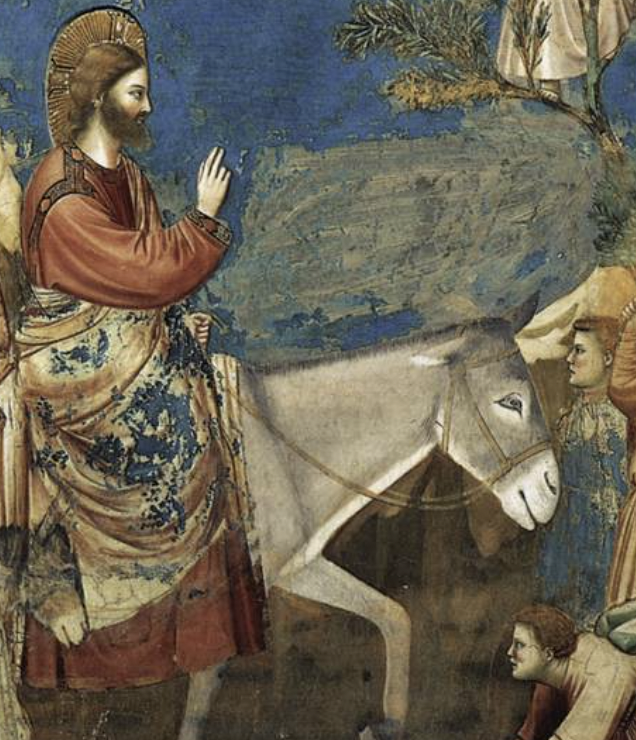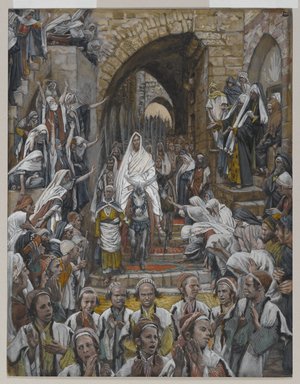Zechariah 9:9-12 (Matthew 21:1-9)
Pastor James Preus
Trinity Lutheran Church
March 24, 2024
When Jesus entered Jerusalem riding on a donkey, He fulfilled what was spoken by the prophet Zechariah 550 years earlier in chapter 9 of his book. So, let us examine what the Holy Spirit caused Zechariah to write, which Christ fulfilled.
“Rejoice greatly, O daughter of Zion! Shout aloud, O daughter of Jerusalem!” Jerusalem and Zion are the same. The prophet tells the inhabitants of Jerusalem to rejoice. Why? Because their king is coming to them! This indeed is reason to rejoice. In 587 BC the last king of Judah in Jerusalem, King Zedekiah was taken in chains to Babylon after all his sons were slaughtered before him. Over six hundred years later, Jerusalem still had not had another son of David sit on his throne. Yet, now the crowds are crying, “Hosanna to the Son of David!” After over six hundred years, their King had returned! Jesus is indeed the son of David, the rightful heir of the throne in Jerusalem. Although King Zedekiah’s line was ended by King Nebuchadnezzar, God preserved David’s lineage through King Jehoiachin, whom Matthew calls Jechoniah (Matthew 1:11-12), who reigned as king in Jerusalem before Zedekiah, but was taken to Babylon as a captive (2 Kings 24-25).
Jesus is the Son of David, the rightful King in Jerusalem. Yet, He does not come to be an earthly king in Jerusalem. His kingdom is not of this world (John 18:36). Jesus is that Son of David, of whom David in the Spirit spoke in Psalm 110, “The LORD said to my Lord, sit at My right hand until I place Your enemies under Your feet.” Jesus is not only David’s son, but He is David’s Lord! So, yes, Jerusalem, your King is coming to you. But not as you may think! This is your heavenly King, who comes to rescue you from a greater enemy than the king of Babylon or the emperor of Rome. He comes to rescue you from sin, death, and hell! This means that he comes not only into the earthly Jerusalem, the city of the Jews. He comes into the spiritual, heavenly Jerusalem, His Holy Christian Church, to whom He brings righteousness and salvation.
Behold, your King is coming to you; righteous and having salvation is He. What does this mean, righteous? Scripture uses the word so often, that we sometimes don’t stop to ask what righteousness means. Some define righteousness as a synonym for salvation or to mean, “way of salvation,” because of how frequently righteousness is paired with salvation in Scripture. However, righteousness is also frequently paired with judgment! David declares in Psalm 1 “Therefore the wicked will not stand in the judgment, nor sinners in the congregation of the righteous,” indicating that only the righteous will stand at God’s judgment.” Psalm 143 makes it even clearer, “Enter not into judgment with your servant (O LORD), for no one living is righteous before you.” (vs. 2)
According to the Law, the righteous are those who live according to God’s commandments. Yet, there is a problem. The preacher declares in Ecclesiastes 7, “Surely there is not a righteous man on earth who does good and never sins.” (vs 20) And St. Paul declares in Romans 1, “For the wrath of God is revealed from heaven against all ungodliness and unrighteousness of men,” and later concludes in chapter 3, “None is righteous, no, not one.” (vs 10; Psalm 14:3)
Then how can Jesus the King from heaven come into Jerusalem bringing both righteousness and salvation when according to the Law of God, God’s righteousness brings judgment upon the unrighteous, and everyone living is unrighteous? St. Paul explains in Romans 3, “But now the righteousness of God has been manifested apart from the law, although the Law and the Prophets bear witness to it— 22 the righteousness of God through faith in Jesus Christ for all who believe. For there is no distinction: 23 for all have sinned and fall short of the glory of God, 24 and are justified by his grace as a gift, through the redemption that is in Christ Jesus, 25 whom God put forward as a propitiation by his blood, to be received by faith.” (vss 21-25a)
Christ Jesus brings righteousness and salvation, because He Himself is our righteousness! He obeyed the Law in our place and is the one and only righteous man ever to live. Then He went as a spotless Lamb to slaughter and made atonement for all our sins by bearing them on the cross. The righteousness Christ brings into Jerusalem is His own righteousness, which He gives to us as a gift to be received by faith. St. Paul writes in Philippians 3, “For His sake I have suffered the loss of all things and count them as rubbish, in order that I may gain Christ, and be found in Him, not having a righteousness of my own that comes from the Law, but that which comes through faith in Christ, the righteousness from God that depends on faith.” (vss. 8b-9)
Christ brings righteousness with salvation, because He comes humble, riding on a donkey. He who was in the form of God, not considering it robbery to be equal to God, emptied Himself into the form of a servant. And in this way, He became the perfect Lamb of God. On the day Jesus entered Jerusalem, the Jews were choosing their sacrificial Passover lambs, which they would bind until they were sacrificed four days later. Their lambs had to be without blemish and meet all the specifications of Scripture. This indeed describes Christ Jesus, who is without sin, true man, yet true God, the perfect High Priest and the only Victim, who can forever pacify God’s wrath against sin.
When the Jews would bring their Passover lambs to be sacrificed, they would chant Psalms 113 through 118 responsively with the priests, the people responding with Hallelujah after each line. This song was known as the Hallel. The cry of the people as Jesus entered Jerusalem, “Blessed is He who comes in the name of the Lord! Hosana in the highest!” is part of the Hallel, from Psalm 118:25-26. Yet, if you keep reading the Psalm you get to this line, “Bind the festal sacrifice with cords, up to the horns of the altar!” (vs. 27) This certainly was fitting when bringing their bound Passover lambs to be sacrificed, yet it is even more fitting when describing Christ Jesus, who humbly rides upon a donkey into Jerusalem, where He will be sacrificed for our sins. Later, he will be bound by the guards of the chief priests and again by Pilate’s soldiers, but He is already bound here by His love to go uncomplaining forth to bear our sins.
“I will cut off the chariot from Ephraim and the warhorse from Jerusalem; and the battle bow shall be cut off and He shall speak peace to the nations.” Jerusalem is the City of Peace. Salem means peace. Jesus’ many-great-grandfather Solomon, who also rode into Jerusalem on a beast of burden when He was made king, his name means peace. We call today Palm Sunday, because St. John records in chapter 12 that they took palm branches to wave before Christ. Yet, Matthew records that they took tree branches. Having come from the Mount of Olives, it is very likely that the crowd cut olive branches down as well as palm branches to lay before Christ and to wave in the air before Him. Olive branches are an ancient symbol of peace. Jesus’ triumphal entry into Jerusalem is filled with symbols of peace. Yet, none as profound as the reason He comes to this city: not to wield a sword against His enemies, but to lay down His life for His friends. The Prophet Isaiah foretold, “Upon Him was the chastisement that brought us peace, and with His stripes we are healed.” (Isaiah 53:5) And after having been delivered up for our trespasses and raised for our justification (Romans 4:25), Jesus declared God’s peace to His disciples (John 20:19), which is received through faith (Romans 5:1; John 20:29). And this peace Christ has spread throughout the whole earth through the preaching of the Gospel, so that His kingdom stretches from sea to sea, even to the end of the earth.
“Also you, because of the blood of your covenant, I will set free your prisoners from the waterless pit.” In Exodus 24, Moses sacrificed oxen on an altar at the foot of Mount Sinai. Half the blood he poured against the altar. The other half, he threw on the people saying, “Behold the blood of the covenant that the Lord has made with you in accordance with all these words.” (vs. 8) Yet, this covenant failed to give them peace or rescue them from their sins. Christ Jesus comes to shed His own blood to enact a New Covenant, which will rescue all who believe in Him from the waterless pit of hell. The Jews who cried for Jesus’ crucifixion said, “His blood be on us and on our children.” (Matt. 27:25) They meant it derisively, because they were not afraid of the guilt of killing Jesus. Yet, we pray it fervently, knowing that the blood of Jesus Christ cleanses us from all sin. (1 John 1:7) May His blood ever be on us and on our children through faith in Him!
So, we take comfort that God caused His prophet to declare 550 years before Christ shed His blood, that by this blood God will rescue us from the pit of hell. In Nehemiah 9, the Levites say to God, “You have kept your promise, for You are righteous.” (vs. 8) We are called unrighteous when we do not do according to God’s Word. God is called righteous, because He always does according to His word. He always keeps His promises. He says He will rescue us by the blood of the covenant, which He cut with us when He shed Jesus’ blood on the cross, and He will surely do it!
This is why we hearken to His invitation when He says, “Return to your stronghold, O prisoners of hope!” We return to the stronghold of the Holy Christian Church, where Christ’s blood is sprinkled on us through the preaching of the Gospel and the administration of the Sacraments. We were prisoners of despair, but now we are prisoners of hope. To be a prisoner of hope means to be a prisoner of Christ. It means to be set free from sin, guilt, shame, despair, and the fear of death. May we ever be captivated by the hope of Christ, who has died for us and restored to us double what we had lost by our sin.
Holy Week, when Christ rode into Jerusalem to be betrayed, beaten, and crucified for our sin before rising from the dead is the most important week in human history. All the prophets looked forward to this week. And the Apostles and Evangelists constantly point us back to it. This is the week Christ our King fulfilled all of Scripture for us, rescuing us from the pit of hell and declaring peace from God to us. So, this week we refocus the attention of the Church on her most sacred task: to strip ourselves of our pride and individualism and lay it all down before Christ, so that He may enter through the gates of our hearts, as the crowd stripped themselves of their garments and laid them before Christ. Christ enters the gates of Jerusalem as our King of Peace today through the preaching of the Gospel and in the Sacrament of His body and blood. Through faith in Christ, you are the daughters of Zion, the eternal inhabitants of Jerusalem. Rejoice greatly, your King has come to you. Amen.



 RSS Feed
RSS Feed